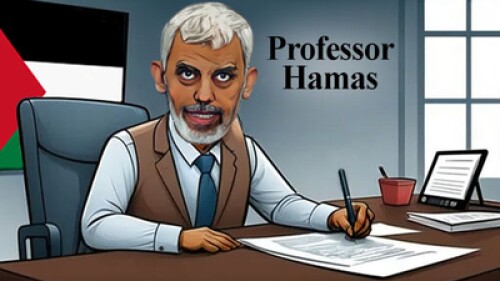Brown University, with a Middle East studies department currently offering no courses and losing one of its few professors in the field, is hosting a workshop titled “The Study of the Middle East and Islam: Challenges After 9-11” on May 3-4. Sponsored by the Middle East/Islamic Studies Initiative, the Watson Institute for International Studies, and the Middle East Studies Association (MESA), the workshop purports to explore
”...some of the challenges facing American higher education as it seeks to... help foster a greater understanding in this country of the Middle East and Muslim world.”
The conference will discuss “new national security regulations” and the “publishing environment faced by scholars writing about the region,” as well as “pressures from concerned citizen groups,” all of which are seen as impediments to “open discourse and academic freedom.”
Ironically, it is the very goal of open discourse and academic freedom that has led organizations such as Campus Watch (a “concerned citizen group” for which I work) to criticize the preponderance of politicized professors in Middle East studies. The Brown University workshop only reflects the one-sided approach to Middle East studies that exists in departments across the country.
The viewpoints represented at this event are far from excluded anywhere in academia. The spin that the dominant voices in the field face repression is positively Orwellian. It is normally pro-American and pro-Israel speakers who are left out of the equation. Proving the point, Blogger Omri Ceren of Mere Rhetoric quotes a member of a campus group at Brown on the workshop:
“There are no pro-Israel speakers, and neither Hillel nor Brown Students for Israel were even asked for input on a conference about the future of Middle East Studies.”
Similarly, Posusney is a member of the MESA committee on academic freedom in the Middle East and North Africa and has signed letters to Columbia president Lee Bollinger defending the less than stellar work of Rashid Khalidi and Joseph Massad.
Conference speakers include a slew of academics with problematic backgrounds. Lisa Anderson, dean of international affairs at Columbia and past president of MESA, is one of them. Anderson has consistently used her position at Columbia to promote ideologues Rashid Khalidi and Joseph Massad, and has contributed to the books of Georgetown’s John Esposito. Anderson also seems to have an affinity for Muslim strongmen, having invited Libyan dictator Muammar Gadhafi to speak at Columbia, as well as Iranian president Mahmoud Ahmedinejad, a move that was later overruled by Columbia president Lee Bollinger.
In a blatant conflict of interest, Anderson was appointed to the committee that oversaw the accusations of anti-Israel and anti-Semitic bias and intimidation at Columbia brought to light by the David Project’s film Columbia Unbecoming. Unsurprisingly, the committee dismissed almost all the charges. It’s difficult to imagine that Anderson will bring any more objectivity to the Brown University workshop than she did the Columbia committee.
Also speaking at the Brown workshop is professor of international affairs at Harvard’s Kennedy School of Government, Stephen Walt, whose notorious article, co-authored with University of Chicago political science professor John Mearsheimer, in the London Review of Books last year, “The Israel Lobby and U.S. Foreign Policy,” has provided succor to anti-Semitic conspiracists across the globe.
Speaking on the same panel is professor of the modern Middle East and South Asian history at the University of Michigan and past president of MESA, Juan Cole. Cole is perhaps best known for being turned down last year for an appointment by Yale University, a rejection he chalked up to a “concerted press campaign by neoconservatives” Yale’s decision was based on his scholarly work, or rather lack thereof. (Read more about Cole’s self-styled martyrdom, including links to articles on the Yale controversy, in this recent Campus Watch blog item).
Mere criticism or, heaven forbid, competition from scholars putting forth more balanced offerings, has the Middle East studies establishment whining about repression. Perhaps what’s really at play is an awareness that when put to the test in the marketplace of ideas, their work cannot stand up to scrutiny.
The fear of accountability on display across the board at the Brown University workshop speaks to the latent power of public scrutiny over the once insulated world of academia and in particular, Middle East studies. It was in fact the attacks of 9-11 that galvanized opposition to the intellectual bullying characteristic of the field. The resulting hysteria may be an indication that such professors are at last feeling the pressure.
One can only hope.
Cinnamon Stillwell is the Northern California Representative for Campus Watch.



